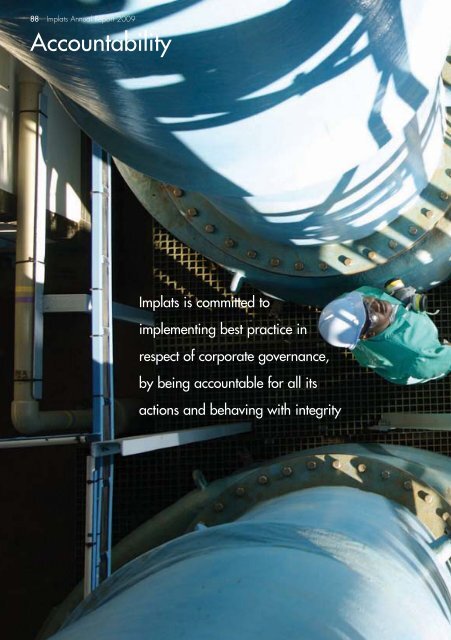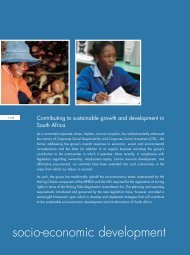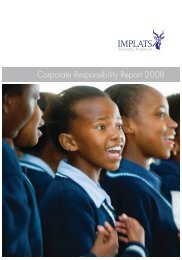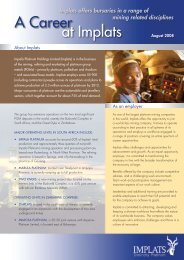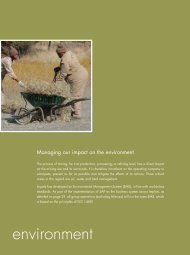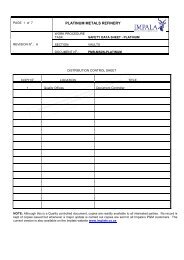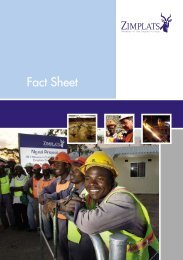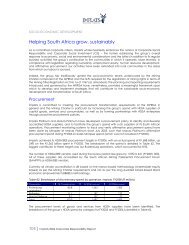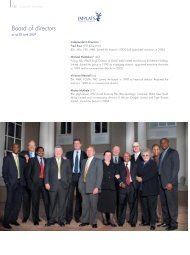Accountability - Impala Platinum
Accountability - Impala Platinum
Accountability - Impala Platinum
You also want an ePaper? Increase the reach of your titles
YUMPU automatically turns print PDFs into web optimized ePapers that Google loves.
88 Implats Annual Report 2009<strong>Accountability</strong>Implats is committed toimplementing best practice inrespect of corporate governance,by being accountable for all itsactions and behaving with integrity
Implats Annual Report 2009 89<strong>Impala</strong> Refineries, Springs
Board of directorsImplats Annual Report 2009 90Implats’ board of directors, which provides corporatestrategic direction, comprises a balance of executive andnon-executive directors, with the majority of the latterbeing independent.
91 Implats Annual Report 2009Board of directors7682Independent non-executive directors1. Fred Roux (Chairman) (61)BSc, MSc, PhD, MBA. Joined the board in2004 and appointed Chairman in 2004.2. Fatima Jakoet (49)BSc, CTA, CA(SA). Non-executive directorof the South African Reserve Bank,Metropolitan Holdings Group and MTNGroup (West African Region). Joined theboard in August 2007.3. Michael McMahon* (62)Pr.Eng. BSc (Mech Eng). Director of Murray& Roberts Holdings Limited, Central RandGold Limited and Central Rand Gold SALimited. Joined the group in 1990 asmanaging director, appointed chairman in1993 and a non-executive director in2002.4. Vivienne Mennell (66)BA, MBA, FCMA, THD. Joined the board in1990 as financial director. Re-joined theboard in 1998 as a non-executive director.5. Khotso Mokhele (53)BSc (Agriculture), MSc (Food Science) PhD(Microbiology). Chairman of ArcelorMittalSouth Africa Limited and Adcock IngramHoldings Limited. Non-executive director ofAfrican Oxygen Limited and Tiger BrandsLimited. Joined the board in 2004.
92 Implats Annual Report 200910 111 46. Thandi Orleyn (53)B Juris, B Proc, LLB. Non-executive directorof ArcelorMittal South Africa Limited,Reunert Limited and the South AfricanReserve Bank. Joined the board in 2004.7. Lex van Vught (66)BSc (Hons) (Chemistry), B Comm.Chairman of Tiger Brands Limited and nonexecutivedirector of AECI Limited. Joinedthe board in 2004.* BritishNon-executive directors8. Thabo Mokgatlha (34)CA(SA). Non-executive director of RoyalBafokeng Holdings (Pty) Limited. Joined theboard in 2003 as nominee of the RoyalBafokeng Nation.9. Steve Phiri (53)B Juris, LLB, LLM, HDip Co Law. ChiefExecutive Officer of Merafe Resources Limited.Member of the Minerals and Mining Board.Non-executive director of Royal BafokengHoldings (Pty) Limited and SA Eagle Limited.Joined the board in June 2007 as nominee ofthe Royal Bafokeng Nation.
ManagementImplats Annual Report 2009 94In addition to EXCOM, various committees, of whichImplats’ executives and senior management aremembers, oversee all aspects of the company’s businessand its day-to-day operations.
95 Implats Annual Report 2009Management1 4 3 5EXCOM(Day-to-day management of group operations)1. David BrownChief Executive Officer2. Jon AndrewsGroup Executive: SHEQ3. Brenda BerlinGroup Executive: Commercial4. Shadwick BessitExecutive Director: Growth Projects5. Paul DunneGroup Executive: Operations6. Dawn EarpExecutive Director: Finance7. Derek EngelbrechtGroup Executive: Marketing8. Paul FinneyGroup Executive: Refining9. Alex MhembereChief Executive Officer: Zimplats10. Les PatonExecutive Director: Mineral ResourceManagement and Mining Operations11. Johan TheronGroup Executive: PeoplePermanent invitees12. Bob GilmourGroup Executive: Corporate Relations13. Paul SkivingtonGroup Executive: Strategy and RiskTreasury Committee(Conversion of foreign exchangeproceeds to rands and hedging metalsales)Warren AdamsGroup TreasurerDavid BrownChief Executive OfficerDawn EarpExecutive Director: FinanceDerek EngelbrechtGroup Executive: Marketing
96 Implats Annual Report 200911 2 9 8Risk Management Committee(Enterprise risk management)Jon AndrewsGroup Executive: SHEQShadwick BessitExecutive Director: Growth ProjectsPaul DunneGroup Executive: OperationsDawn EarpExecutive Director: FinancePaul FinneyGroup Executive: RefiningNonhlanhla MgadzaGroup Head: Internal AuditAlex MhembereChief Executive Officer: ZimplatsReshma RamkumarGroup Risk AnalystPaul SkivingtonGroup Executive: Strategy and RiskJohan TheronGroup Executive: PeopleAvanthi ParboosingGroup SecretaryGROWCO(Growth and capital delivery)Brenda BerlinGroup Executive: CommercialChris McDowellGroup Executive: New BusinessDerek EngelbrechtGroup Executive: MarketingMartyn FoxGroup Executive: Technical SupportRob DeyGroup Executive: ProjectsShadwick BessitExecutive Director: Growth ProjectsSeef VermaakGroup Executive: Mineral ResourceManagementPEOPLECO(Managing and developing people andcommunities)Colin SmithGroup Talent ManagerHumphrey OliphantGroup Employee Relations Manager
Implats Annual Report 2009 9713 12 6 10 7Johan TheronGroup Executive: PeopleJohanna TauGroup Stakeholder ManagerKaren OttoGroup Reward ManagerPierre LourensGroup Sustainable Development ManagerFINCO(Support, protection and service functions)Dawn EarpExecutive Director: FinanceNonhlanhla MgadzaGroup Head: Internal AuditFrancois NaudeGroup Executive: Financial ControlAvanthi ParboosingGroup SecretaryJohn StraussGroup Executive: Shared ServicesLeon van SchalkwykGroup Strategic Finance ManagerStefanie VivierGroup Legal Services ManagerOPCO(Delivery through effective safety, costand production leadership)Jon AndrewsGroup Executive: SHEQPaul DunneGroup Executive: OperationsPaul FinneyGroup Executive: RefiningTinus GerickeGeneral Manager: Technical ServicesSean GrahamGeneral Manager: ProcessingJacques van SchalkwykManagement Accounting Manager:OperationsLes PatonExecutive director: Mineral ResourceManagement and mining operations
98 Implats Annual Report 2009Corporate governanceThe board of directors of Implats is committed to maintaining high standards of governance whendischarging their fiduciary duties, and as such, sound corporate governance structures and processesare entrenched within the group. These structures and processes are regularly reviewed to comply withlocal and international best practice.In the year under review, Implats complied with the King Code of Corporate Governance (King II) andutilised the Code's principles to establish and enhance its governance framework. The group'ssubsidiary companies were also guided by this framework and those subsidiaries operating outsidethe jurisdiction of South Africa ensured compliance with local law.A revised Code of Corporate Governance (King III) is currently being circulated for comment andreview by all interested parties and it is anticipated that compliance with the new code will becompulsory in the forthcoming year.Implats maintains a primary listing of ordinary shares on the Johannesburg Stock Exchange (JSE) anda secondary listing on the London Stock Exchange (LSE). In addition to local compliance, the companyis accordingly subject to the disclosure requirements of the LSE.Implats gives priority to sound corporate governance principles, and as such, governance will continueto receive the board and its committees' attention as they strive to provide strategic oversight andleadership to the company.Board of directorsIn compliance with the company's articles of association, the board comprised thirteen directors. Therewere seven independent non-executive directors, two non-executive directors and four executivedirectors on the board.Dr FJP Roux, an independent non-executive director is chairman of the board. Mr DH Brown, anexecutive director, is the chief executive officer. The roles of the chairman and chief executive officerare distinctly separate.Mr TV Mokgatlha, and Mr DS Phiri are not considered to be independent given their relationship withthe Royal Bafokeng Nation, a substantial shareholder of the company. During the year, Mr N Carrollwas appointed as an alternate director to Mr TV Mokgatlha. Mr Carroll, as the chief executive officerof Royal Bafokeng Holdings is also not independent. The board holds the view, however, that alldirectors bring independent judgment to bear on material decisions put to the board for consideration.On 30 June 2009, Mr LC van Vught resigned as a non-executive director of the board and as amember of the Audit Committee and chairman of the Remuneration Committee. There have been nonew appointments to the board replacing Mr van Vught.
100 Implats Annual Report 2009Corporate governance (continued)Attendance at board meetings and committee meetings is set out in the table below:Attendance at board, committee meetings and annual general meetingNomina- Remune- Transfor- AnnualSpecial Audit tions ration SHEQ mation GeneralBoard Board Committee Committee Committee Committee Committee MeetingNumber of meetings 6 1 4 4 4 4 4 1FJP Roux • 5/6 1/1 4/4 4/4 4/4 ✓S Bessit 6/6 1/1 4/4 ✓DH Brown* 6/6 1/1 4/4 4/4 ✓D Earp† 6/6 1/1 4/4 ✓F Jakoet 6/6 1/1 4/4JM McMahon 6/6 1/1 1/1 4/4 4/4 ✓MV Mennell 6/6 0/1 4/4 4/4 ✓TV Mokgatlha 5/6 1/1 4/4 ✓K Mokhele 6/6 1/1 4/4 4/4 4/4NDB Orleyn 6/6 1/1 1/1 4/4 4/4 ✓LJ Paton 6/6 1/1 3/4 ✓DS Phiri 5/6 1/1 4/4LC van Vught 5/6 1/1 4/4 1/1 ✓MF Pleming ø 3/4* Chief executive officer† Executive director: financeø External consultant• ChairmanBoard committeesAudit CommitteeMembers:Michael McMahon (Chairman)Fatima JakoetVivienne MennellLex van VughtOn 1 May 2009, Mr Michael McMahon was appointed as an additional member and chairmanof the Audit Committee in place of Mr Lex van Vught. Mr van Vught retained membership of thecommittee until his resignation on 30 June 2009.The Audit Committee comprised four independent non-executive directors until Mr van Vught’sresignation. Its role is to provide assurance that relevant board duties are discharged by:• monitoring the integrity of the financial statements and other relevant external financial reports ofImplats and reviewing all significant inputs, judgments and outputs in order to present a balancedand understandable assessment of the position, performance and prospects of Implats, asappropriate;
Implats Annual Report 2009 101• reviewing the company's internal financial control and financial risk management systems in orderto safeguard Implats' assets;• monitoring and reviewing the effectiveness of Implats' internal audit functions;• recommending to the board the appointment of the external auditors, approving the remunerationand terms of engagement of the external auditors and monitoring their independence, objectivityand effectiveness, taking into consideration relevant professional and regulatory requirements; and• regulating the use of the external auditors for non-audit duties in terms of a policy documentprepared and enforced which governs the use of external auditors for non-audit services. The useof the external auditors for non-audit services is disclosed in the annual financial statements.The committee, in carrying out its tasks, has a wide range of powers to consult both internally andexternally. The overriding principle is that the Audit Committee shall be provided with sufficientresources to undertake its duties.Its terms of reference allow the investigation into any activity of the company and permit the seekingof information or advice from any employee in the course of its duties. The chairman of the AuditCommittee meets at least once a year on an individual basis with the external and internal auditors,the chief executive officer and the chief financial officer without any other executive member of theboard in attendance.The Audit Committee oversees the Risk Management Committee.Nominations CommitteeMembers:Thandi Orleyn (Chairperson)Khotso MokheleFred RouxVivienne MennellThe committee comprises four independent non-executive directors. Ms Thandi Orleyn was appointed asan additional member and chairperson of the committee on 1 May 2009 in place of Dr Khotso Mokhele.This committee assists the board in ensuring that the structure, size, effectiveness and composition ofthe board and its committees:• are reviewed regularly;• comprise the requisite mix of skills, experience, diversity and other qualities;• align with the strategic direction and requirements of Implats, and• meet the requirements of sound corporate governance.The Nominations Committee is also responsible for ensuring that the board, its directors and itscommittees are assessed regularly; proposing adjustments to the board and its committees; planningfor the succession of directors; recommending appointments and re-elections of directors; establishinga formal induction process and ensuring that a training and development programme is in place forboard members.
102 Implats Annual Report 2009Corporate governance (continued)A self-assessment of the board, an evaluation of the board chairman, as well as an individualevaluation of board members standing for re-election was undertaken during the year by KPMG.Corrective action will be taken by the board and Nominations Committee to address key issuesidentified.An assessment of the board committees and the chairmen of the board committees is planned for theensuing year and will also be undertaken by KPMG to ensure a continuity of the evaluation process.The Nominations Committee oversees the evaluation process as part of its mandate.Remuneration CommitteeMembers:Lex van Vught (Chairman resigned 30 June 2009)Michael McMahonThandi OrleynSteve Phiri (Chairman from 1 July 2009)The Remuneration Committee comprised three independent non-executive directors and one nonexecutivedirector. Mr Lex van Vught was appointed as an additional member and chairman of thecommittee on 1 May 2009 in place of Ms Thandi Orleyn as part of a planned rotation ofresponsibilities. Subsequent to Mr Lex van Vught’s resignation, on 30 June 2009, Mr Steve Phiri wasappointed chairman of the committee effective 1 July 2009. The chairman of the board, chiefexecutive officer and the human resources executive are invited to attend all Remuneration Committeemeetings except when their own remuneration is under consideration.The company's remuneration policy is determined by the Remuneration Committee and strives forcompetitive and fair reward in recognising and rewarding individual and team achievement thatcontributes to the attraction, retention and motivation of employees, and organisational growthand prosperity.The main functions of the Remuneration Committee are to:• determine fixed and variable remuneration for executive directors and senior executives;• ensure the implementation of policies and practices to attract and retain the best talent atexecutive level;• ensure the provision of fair, equitable and competitive conditions of employment across the group;• ensure the effectiveness of a comprehensive talent management process, encompassing employeedevelopment and succession planning;• benchmark remuneration practices against both local and international best practice;• monitor retirement benefits; and• recommend fees for non-executive directors for consideration by executive directors on the board forapproval by shareholders at the annual general meeting.Safety, Health and Environmental Quality Audit CommitteeMembers:Khotso Mokhele (Chairman)Michael McMahonFred RouxDavid Brown (Chief Executive Officer)Mike Pleming (external consultant)
Implats Annual Report 2009 103A board-appointed Safety, Health and Environmental Quality Audit Committee (SHEQ) has been inplace since 1988. Its role in terms of its mandate is to monitor and review safety, health andenvironmental performance and standards. The SHEQ Audit Committee supplements and givessupport, advice and guidance on the effectiveness or otherwise of management's efforts in the areasof safety, health and the environment. The SHEQ Audit Committee comprises threenon-executive directors and the chief executive officer. An external consultant is also a member of thecommittee in line with the committee's initiative to have a wide range of expertise available to it.On 1 May 2009, an independent, non-executive, Dr Khotso Mokhele, replaced Mr MichaelMcMahon as chairman of the committee.The SHEQ Audit Committee meets at least once a quarter. Meetings are held alternately at operations,coinciding with visits to sites of SHEQ importance/relevance or at Implats' head office. At all meetings,Implats' overall performance in all areas of safety, health and the environment is critically appraised.Internal audit regularly reviews reporting systems to ensure that injuries sustained byemployees/contractors are reported timeously and effectively.Transformation CommitteeMembers:Khotso Mokhele (Chairman)Thandi OrleynFred RouxThabo MokgatlhaShadwick BessitDavid BrownDawn EarpLes PatonPaul FinneyJohan TheronAvanthi Parboosing (Secretary)The composition of the Transformation Committee was altered during the year. The committee nowcomprises three independent non-executive directors, a non-executive director, the four executivedirectors and two executives.The committee is responsible for monitoring the progress of achieving a transformed workforce by:• advising and guiding the board in any decision making process relating to transformation;• guiding the organisation on issues of transformation;• consulting all role players to ensure commitment and adoption of an inclusive approach inaddressing transformation issues;• providing quality assurance regarding the implementation of all transformation processes; and• ensuring transparency in communication in respect of the transformation processes.The challenge of achieving the company's strategic imperative of becoming a transformed workplace,hinges on it meeting and exceeding its targets and the numerical goals set as per the EmploymentEquity Act, the Mineral and Petroleum Resources Development Act (MPRDA) and the related MiningCharter. These targets have been affected by the amendment to the Employment Equity Act regardingthe definition of designated groups.With the increased emphasis on sustainability and its inseparable interface with the strategy of thecompany, the committee also plays a material role in reviewing and providing guidance onsustainability issues facing the group. The committee also plays a substantial role in assisting thecompany on its sustainability reporting and the need for independent assurance thereof.
104 Implats Annual Report 2009Corporate governance (continued)The Transformation Committee of the board as well as the transformation steering committees at allSouth African operations monitor targets and numerical goals.Employment equity statistics 2009Below is a summary of the 2009 employment equity report as required by section 22(1) of theEmployment Equity Act of 1998 based on occupational levels at Implats’ South African operations,broken down by number of employees within each category. The table includes the following: white(W), coloured (C), Indian (I), and African (A) population groups including persons with disabilities.Male Female Foreign nationalsOccupational levels A C I W A C I W Male Female TotalTop management – 1 – 2 – – – 1 – – 4Senior management 11 3 2 64 3 – 1 6 6 – 96Professionally qualified andexperienced specialists and midmanagement156 7 18 316 36 2 10 70 12 2 629Skilled technical and academicallyqualified workers, juniormanagement, supervisors, foremen,and superintendents 2 463 27 7 1 070 250 6 3 140 376 1 4 343Semi-skilled and discretionarydecision making 3 836 11 4 188 567 2 2 49 657 – 5 316Unskilled and defined decisionmaking 17 200 12 – 25 1 634 5 – 1 3 785 2 22 664Total permanent employees 23 666 61 31 1 665 2 490 15 16 267 4 836 5 33 052Temporary employees 80 10 – 64 20 1 – 1 1 – 177Grand total 23 746 71 31 1 729 2 510 16 16 268 4 837 5 33 229Company secretaryBoard members have access to a company secretary who is appointed in accordance with the JSEListing Requirements and the Companies Act (as amended). The company secretary provides guidanceto the directors on their fiduciary duties and ensures that the board remains cognisant of itsresponsibilities and the discharge thereof, within the prevailing regulatory and statutory environment.The board is also entitled to seek additional independent advice as it deems necessary.Other corporate governance issuesRisk managementA summary of Implats’ strategic risks is presented in a separate section of this report on page 109.
Implats Annual Report 2009 105Internal controlThe board has ultimate responsibility for establishing a framework for internal controls designed toeffectively provide reasonable assurance against material loss, including appropriate risk managementand good corporate governance frameworks and systems. Implats has established key controls thatfocus on critical risk areas identified by line management, facilitated by risk management and assessedand evaluated by the internal auditors. The controls are designed to provide a cost effective assurancethat Implats assets are safeguarded and that liabilities and working capital are efficiently managed.The established organisational policies, procedures, standards, guidelines, structures and delegationframeworks clearly define and provide appropriate levels of direction, accountability and segregationof responsibility; which facilitate self checking and monitoring mechanisms.Internal auditGroup internal audit is an independent objective assurance that delivers substantial benefits toImplats by primarily focusing on the systems of internal control, resulting in better risk managementand good governance as well as achievement of set business objectives. Internal audit is wellsupported by the board and well-positioned to deliver on its mandate. In keeping with bestpractice, the group internal auditor reports to the executive director, finance for administrativepurposes and to the Audit Committee chairman for functional purposes. The group internal auditoralso holds quarterly meetings with the chairman of the board and the chief executive officer todiscuss internal audit issues. The internal audit charter provides a structured framework withinwhich the internal audit function operates and continuous improvement in the quality andobjectivity of the function remains a priority for the group internal auditor.Code of ethicsImplats has a code of business practice to which all employees and suppliers are expected andencouraged to adhere. The policy outlines conflicts of interest, the prevention of dissemination ofcompany information, guidelines on the acceptance of donations and gifts, and protection of theintellectual property and patent rights of the company. The policy outlines the disciplinary action(including dismissal or prosecution) which will be taken in the event of any contravention. A “whistleblowing”toll-free helpline is in place to facilitate the confidential reporting of alleged incidents whichare reported to the chairman of the board. In essence, the code is designed to ensure that allstakeholders are empowered to operate within a defined ethical environment.Dealings in securitiesThe group observes a closed period from the end of the relevant accounting period to theannouncement of the interim or year-end results, as the case may be, during which neither directorsnor employees may deal, either directly or indirectly, in the shares of the company or its listedsubsidiaries. The company secretary is responsible for providing guidance to the board and tomanagement on dealing in securities during specific periods. A report on directors' dealings incompany's shares is tabled at every quarterly Audit Committee meeting.Sustainability reportingThe company publishes a Sustainable Development Report (formerly titled the Corporate ResponsibilityReport) in conjunction with the Annual Report. The full contents of the report can be accessed on thecompany's website (www.implats.co.za).
106 Implats Annual Report 2009Corporate governance (continued)JSE Socially Responsible Investment (SRI) IndexImplats has been a constituent of the JSE SRI index since the inception of the index.The index assesses the constituent's performance in terms of triple bottom line reporting regarding theenvironment, society and the economy, as well as corporate governance.Relations with shareholdersInvestors, fund managers, analysts, the media and the market are kept fully informed of alldevelopments. Implats communicates regularly with shareholders and other stakeholders regardingits financial and operational performance. Communication with interested institutional and privateinvestors pays due regard to the statutory and regulatory requirements on the communication ofprice sensitive information by the company and its officers.The shareholder communication functions of the company secretary and the share registrar aresupported by an investor relations programme which operates in South Africa, Europe, the UnitedStates and Canada. The programme is aimed at maintaining contact with institutionalshareholders, fund managers and analysts in these countries as well as the media. It is also aimedat undertaking formal financial disclosure through interim and annual results announcements, theannual report, road shows, press releases, ad hoc investor meetings, participation in investmentconferences and the website.In particular, road shows and teleconference calls also provide investors with the opportunity tocommunicate with management and to make recommendations to the board. Management is alsoopen to meetings requested by shareholders and contact details are available on thecompany website.The result announcements, both interim and annual, take the form of live presentations which arewebcast simultaneously. Quarterly production reports are also released, as required by the LSE.International conference calls are also held. All presentations, webcasts and conference calltranscripts are available on the website (www.implats.co.za). In addition, copies of allpresentations made by executive management to the investment community are posted onthe website.DividendsIt is company policy to pay a dividend twice a year, firstly at the end of the interim financial periodand secondly, at the end of the financial year. While the payment of dividends is not guaranteed,dividends have been paid consistently in the past. The interim dividend of 120 cents per shareand the final dividend of 200 cents per share were not in line with the stated dividend policy butwere based on a cash quantum basis in view of the prevailing uncertain economic circumstances.Access to informationImplats has complied with the requirements of the Promotion of Access to Information Act of 2000.The corporate manuals are available on the website www.implats.co.za.
Implats Annual Report 2009 107SponsorDeutsche Bank is the company's corporate sponsor, in compliance with the JSE listing requirements.Annual general meetingEffects and implications of the annual general meetingThe notice of the annual general meeting on pages 235 to 238 includes the following items:1. Approval of the annual financial statements for the year ended 30 June 2009.2. Re-appointments of directors of the company who retire from office at this meeting and who offerthemselves for re-election are Ms Dawn Earp, Ms Thandi Orleyn and Dr Khotso Mokhele.Mr Shadwick Bessit retires at this meeting and does not avail himself for re-election. The articlesof association require that at least one-third of the board retire from office annually and stand forre-election by shareholders at the annual general meeting.The curriculum vitae of all directors to be re-appointed at the annual general meeting are set out below:Dawn Earp (Executive director) (47)BCom, BAcc, CA(SA). Joined the group in 2007 as Executive Director: Finance. Non-executivedirector of Rand Refinery Limited.Khotso Mokhele (Independent non-executive director) (53)BSc (Agriculture), MSc (Food Science) PhD (Microbiology). Chairman ArcelorMittal South AfricaLimited and Adcock Ingram Holdings Limited. Non-executive director of African Oxygen Limitedand Tiger Brands Limited. Joined the board in 2004.Thandi Orleyn (Independent non-executive director) (53)B Juris, B Proc, LLB. Non-executive director of ArcelorMittal South Africa Limited, Reunert Limitedand the South African Reserve Bank. Joined the board in 2004.3. Directors’ remunerationTo increase the remuneration of the non-executive directors and of the chairman of the boardby 5%.These ordinary resolutions require a simple majority of members present in person or by proxy atthe meeting.
108 Implats Annual Report 2009Corporate governance (continued)Special business4. Changes to the Morokotso Trust deedTo amend the trust deed of the employee share scheme for A, B and C Paterson level employees(Morokotso Trust).The principal amendments to the trust deed constituting the Morokotso Trust may be summarisedas follows :• Clarifying that allocations of shares under the Employee Share Ownership Programme are onlyavailable to defined categories of employees of <strong>Impala</strong> <strong>Platinum</strong> Limited and Marula <strong>Platinum</strong>(Proprietary) Limited (subsidiaries of the company) who were employed in the two-year periodended on 3 July 2008.• Defining the price at which the company has a pre-emptive right to purchase any shares to besold by the Trust.• Specifying that employees eligible for allocations of shares at the commencement of theProgramme were entitled to 568 shares and that any employees who are subsequently eligiblefor allocations are to receive an equal number of shares until the allocated number of sharesreaches 568. Any subsequent allocations are to be made equally to all eligible employees.• Recording the specific powers and duties of the Trustees and issues related to the holding oftheir meetings.• Providing that employees are entitled to sell 40 per cent of their allocated shares after five yearsfrom the commencement of the programme and that such sales and the sale of shares after thetermination of the programme may not take place during closed periods.• Establishing a target price of R170 per share and a prescribed period of six months to sellshares on behalf of employees terminating employment in approved circumstances, (such asretirement/retrenchment/ill health).A copy of the amended trust deed is available for inspection at the registered office of thecompany and is available on the company's website www.implats.co.zaThis ordinary resolution requires approval by a 75% majority of members present in person or byproxy at the meeting.5. Share buy-backTo extend, for a further year, the authority for the directors to buy-back a maximum of 10% of thecompany's issued share capital. The company bought back approximately 2.6% of the issuedshare capital in the prior years, utilising surplus cash to acquire shares at lower price levels. Thespecial resolution requires approval by a 75% majority of members present in person or by proxyat the meeting.Chairmen of all the board committees are encouraged to attend the annual general meeting to answerany questions from shareholders.
Strategic risks – a summaryImplats Annual Report 2009 109Summary of Implats' strategic risk focus in 2009The strategic risk issues that currently face the group and which inform Implats' business planning, riskmanagement and resource allocation priorities are:Safety, health and environmentContinuous improvement in safety, health and environmental performance towards the goal of'zero harm'.ProductionMaintaining reliable and effective production processes and delivering product on time and tospecification.Project deliveryMaintaining effective project management processes and skills to ensure successful projectimplementation and delivery.Supply and demandUnderstanding the future demand for our products, and the corresponding industry supply-side profile.Scanning the environment for technological advances that may affect the demand for Implats' products(substitution), and instituting appropriate responses where possible.Related to the above, the prices achieved for our products have been subjected to unprecedentedvolatility, and metal price fluctuation remains a significant risk for the business.Rand/dollar exchange rateClosely monitoring the rand/dollar exchange rate as a source of significant volatility for our business.Cash preservationFocus on cash management as a key to preserving the financial value of the business.Country riskZimbabweManaging the uncertainties that affect the Zimbabwe operations.SocialAddressing relevant issues regarding sustainability, corporate responsibility, and being recognised asa good corporate citizen in the countries and communities where the company operates, andmaintaining sound and mutually beneficial relationships with them and the general public.Retaining permission to operate, and full legal and regulatory compliance in a continuously changingenvironment.
110 Implats Annual Report 2009Strategic risks – a summary (continued)Effective peopleAttracting, developing, retaining and motivating the requisite management, operational, technical andbusiness skills and pool of talent.Achieving organisational diversity and improved employee engagement and participation in allbusiness activities.GrowthRetaining a focused and sustainable growth portfolio of assets to ensure that the company remains inthe top quartile of performers within its areas of core competence.Unit costsSustaining unit production costs in the lowest quartile of the industry.Mineral resource managementOngoing identification, delineation, measurement and optimisation of mineral resources and reserves.Details of Implats' specific risk factors are available on the corporate website at www.implats.co.za.


